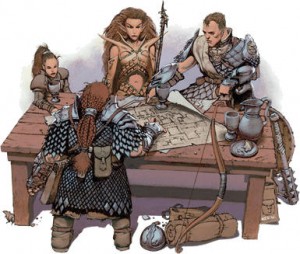Cracked has an excellent article on 5 Creepy Ways Video Games Are Trying to Get You Addicted. It’s not simple
My first GMing experiences were spent with players themselves unfamiliar with tabletop
When I began GMing in earnest later, I noticed an interesting phenomenon: players applying online gaming experience to tabletop gaming. World of Warcraft players were–consciously or subconsciously–creating characters that fit their online gaming experience.
On the one hand, applying related knowledge makes sense. However, the key word here is related knowledge. It’s unwise to assume that computer gaming is similar to tabletop gaming.
Okay, time for an example: I had one player say that we needed a character who’d “pull aggro.” Direct quote. For those unfamiliar with World of Warcraft, aggro is a term for aggressiveness, a quality that monsters use to determine which enemy to attack. A standard WoW tactic involves crafting characters that can attract the enemy’s attention and soak up large amounts of damage, distracting the enemy from physically weaker characters that are helping from the sidelines.
In tabletop games, there is no aggro. The GM decides in the moment which monster attacks which character. The mechanical rules required for a computer game are just that: mechanical rules, simplifications to give the monsters something reasonable to do.
Similarly, I’ve had players refuse to play characters that interest them because the party didn’t have a character that filled a particular standard party role. I’m starting to get angry when I hear the
In tabletop, it’s the GM’s job to craft encounters that challenge the party. If the party doesn’t have healers, the GM has to take that into account. That’s not a deficiency in the party. A GM who can’t deal with this–or who ignores it, or who exploits it to kill the party–is a bad GM, and should not be gamed with.
Play whatever character you want to play. A party of all monks isn’t imbalanced; it’s awesome.
